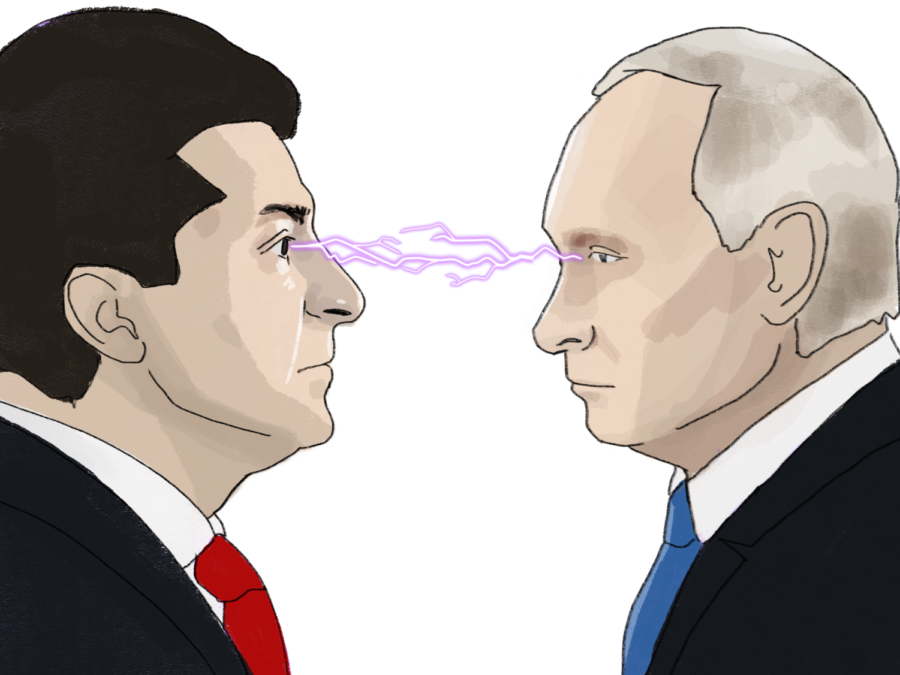Your donation will support the student journalists of The Tide, Richard Montgomery High School's student newspaper. Your contribution will allow us to purchase equipment and cover our annual website hosting costs.
Ukraine War reveals psychological bases of international conflicts
April 8, 2023
One year after Russia’s invasion of Ukraine, researchers have gained various psychological understandings behind war.
During the past two years as The Tide’s Science Writer, I have covered current developments in health, environment and technology, aiming to make technical issues more accessible to the public. This article is the first in a column called “The Psychology Of,” where I’ll explain the relevant psychology behind a salient topic in order to make better sense of it.
In late February, as protesters around the world rallied in support of Ukraine on the anniversary of Russia’s invasion, the two adversaries continued to sustain heavy casualties. Although there is little progress on the battlefield, social scientists have taken away several key insights in the past year about the psychological roots of the war.
The conflict can be traced back to Russian President Vladimir Putin’s bitterness following the collapse of the Soviet Union.
“He clearly feels that that was not the way things should have played out,” IB Global Politics teacher Brian Donlon said. As a result, Putin has clung to his imperialistic ambitions, and marketed to his people a collective national identity and a restoration of Russia’s glory.
“Russia faces the real danger that it could be relegated to the second, or even the third tier of global powers,” Putin warned in 1999, several years after the breakup of the Soviet Union. “Our place in the modern world will be defined only by how successful and strong we are.”
Leveraging the human propensity to view the world in terms of ingroups and outgroups, Putin has united Russians around both a common enemy—the West—and the vision of a Russian nation cheated out of its rightful “first-tier” global status.
According to scientists, Putin has used this narrative of Russia as the victim of NATO’s belligerence to control public opinion. “The Ukrainians are fighting a 21st-century war, which is half on the internet,” Stephan Lewandowsky, a professor of psychology at the University of Bristol, said.
Putin’s appeal to group affiliation offers Russians a sense of personal significance from being part of a larger, superior group—Russia. “Human beings, ineluctably, want meaning and purpose in life,” Martin Seligman, professor of positive psychology at the University of Pennsylvania, wrote in his book on well-being.
Russia interpreted NATO’s attempted expansion into Ukraine in 2008 as Western aggression. “If Ukraine was to join NATO it would serve as a direct threat to the security of Russia,” Putin said in a speech on Feb. 21, 2022. At the same time, NATO perceived its own expansion as a necessary step to protect against the threat of Russia.
This mentality shows that humans have the self-serving tendency to attribute their own actions to external variables (“we arm ourselves in response to other nations’ aggression”) while attributing others’ actions to disposition (“they arm themselves because they are aggressive”).
Mirror-image misperceptions often become self-fulfilling prophecies. By invading Ukraine in response to NATO’s expansion, Putin confirmed the very perception that Russia is aggressive. “When Russia does that, they essentially legitimize NATO’s position,” sophomore Vihaan Rathi said.
Ukrainian President Volodymyr Zelensky’s maintenance of morale through videos—often up close and unpolished—is likely in part why Ukraine has been able to hold Russia at bay for over a year, despite the military might of the latter. “He’s really held his country together when nobody thought it was possible,” Mr. Donlon said.
The actions of Russian leaders, Ukraine and Western countries show that the causes and outcomes of international conflicts can be understood through the lens of human cognition. “All the biases uncovered in 40 years of psychological research are conducive to war,” psychologists Daniel Kahneman and Jonathan Renshon wrote in a 2007 research report.
